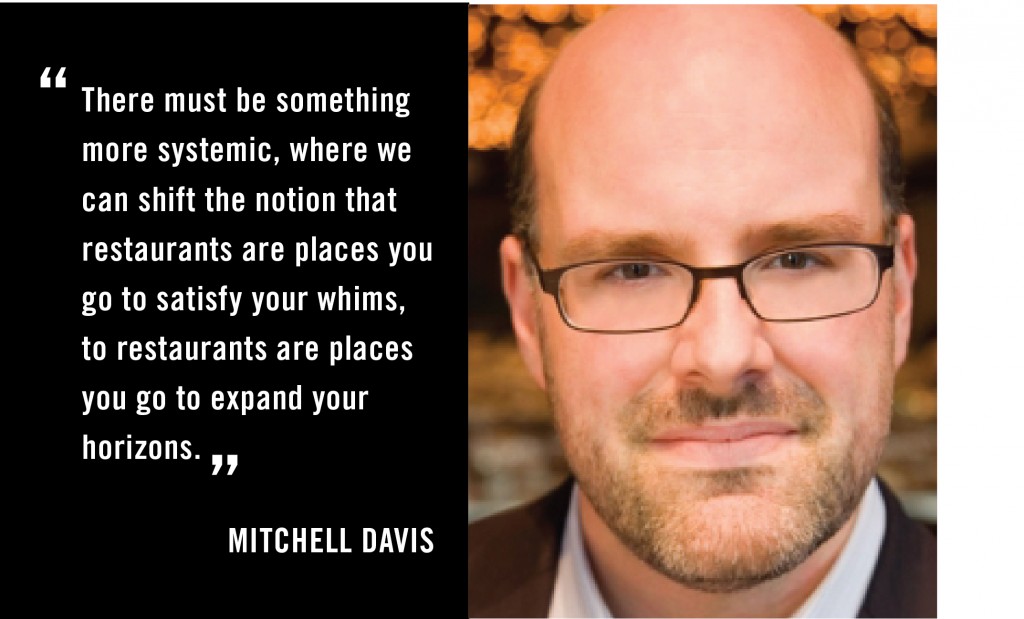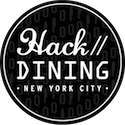Guest post by Mitchell Davis, Executive Vice President, The James Beard Foundation. The views expressed here are solely those of the author and do not reflect the views of Food+Tech Connect.
A dynamic, responsible food culture requires active and informed participation from both sides of the equation: production and consumption. Over the last few decades, the quality of food produced in certain circles in America has improved dramatically. American chefs, wine makers, bakers, farmers, cheese makers, distillers, charcutiers and other culinary craftsmen are producing foods that rival their European counterparts in quality and taste.
But on the other side, American consumers haven’t always risen to their role in the equation.
Burdened by our “the customer’s always right” business mentality, food entrepreneurs have deferred to market research and focus groups to maximize profit and satisfaction. Customers demand what they want and they get it. If they don’t, nowadays they Tweet and Yelp about it.
There’s a profit motive to operate this way, of course. But if we really want to evolve into a sophisticated food culture and we want to allow for the most responsible, sustainable decisions about how we feed ourselves, this imbalance needs to be corrected.
Ask any chef who buys whole animals, and she’ll tell you that people complain when the chops run out. Ask any baker who buys local wheat and he’ll tell you customers complain his prices are too high.
A chef recently told me she was profoundly frustrated by the local restaurant critic whose value rating system hasn’t changed in 20 years, despite rising costs across the board. What’s more, she said, she buys the best, most sustainable ingredients, and therefore her prices are higher than the bistro’s across the street. But not once has the sustainability of her food found its way into a review. Nor has the value of her menu items been assessed in any way that takes the environmental impact and ethics of her ingredients into account.
One way restaurants have changed the power dynamic between producer and consumer has been to switch to a tasting-menu-only format. That way the customer has no choice and the chef can use the ingredients and parts he or she wants, spreading disparate costs over an entire menu, rather than any individual dish.
But there must be something more systemic, where we can shift the notion that restaurants are places you go to satisfy your whims, to restaurants are places you go to expand your horizons.
Maybe technology is the answer?
Is there a way to create a restaurant reviewing app that establishes criteria and builds data based on quality and sustainability as they relate to price? Could we train people who use it by taking on an online course before they are allowed to post? Could we create a way to capture what chefs want to be judged on and align that with what diners are looking for or value?
Hacking Dining is online conversation exploring how we might use technology and design to hack a better future for dining. Join the conversation between June 2-30, and share your ideas in the comments, on Twitter using #hackdining, Facebook, LinkedIn or Tumblr.
________________
 Mitchell is also a cookbook author, a food journalist, and a scholar with a Ph.D. in Food Studies from NYU. With the Beard Foundation for 20 years, Davis has created and overseen many of the organization’s important initiatives, including the the JBF Annual Food Conference, a national dialogue of thought leaders on sustainability and public health in the food system, and the JBF Chefs Boot Camp for Policy and Change. In 2013, Davis led the team that was selected by the U.S. Department of State to create the USA Pavilion at the World Expo Milano 2015, the theme of which is American Food 2.0. In addition to his work at the Foundation, Davis frequently writes about and reviews restaurants. He holds a chair on the academy of the London-based World’s 50 Best Restaurants ranking program. He has written four cookbooks, including The Mensch Chef and Kitchen Sense (both Clarkson Potter), co-authored the ground-breaking electronic book My Provence (Alta Editions) with famed French chef Laurent Gras, which won two 2013 awards from the International Association of Culinary Professionals, including “Judges Choice,” and he is a regular contributor to the Art of Eating. Davis’s T.V. appearances include History Channel’s 101 Fast Foods that Changed the World, Food Network’s Food(ography), Throwdown with Bobby Flay, and Best in Smoke. Davis is host of Taste Matters, a weekly radio show (Wednesdays at 11 a.m.) on The Heritage Radio Network. In 2013 The Forward selected Davis as one of the 50 most influential Jews under 50 in America.
Mitchell is also a cookbook author, a food journalist, and a scholar with a Ph.D. in Food Studies from NYU. With the Beard Foundation for 20 years, Davis has created and overseen many of the organization’s important initiatives, including the the JBF Annual Food Conference, a national dialogue of thought leaders on sustainability and public health in the food system, and the JBF Chefs Boot Camp for Policy and Change. In 2013, Davis led the team that was selected by the U.S. Department of State to create the USA Pavilion at the World Expo Milano 2015, the theme of which is American Food 2.0. In addition to his work at the Foundation, Davis frequently writes about and reviews restaurants. He holds a chair on the academy of the London-based World’s 50 Best Restaurants ranking program. He has written four cookbooks, including The Mensch Chef and Kitchen Sense (both Clarkson Potter), co-authored the ground-breaking electronic book My Provence (Alta Editions) with famed French chef Laurent Gras, which won two 2013 awards from the International Association of Culinary Professionals, including “Judges Choice,” and he is a regular contributor to the Art of Eating. Davis’s T.V. appearances include History Channel’s 101 Fast Foods that Changed the World, Food Network’s Food(ography), Throwdown with Bobby Flay, and Best in Smoke. Davis is host of Taste Matters, a weekly radio show (Wednesdays at 11 a.m.) on The Heritage Radio Network. In 2013 The Forward selected Davis as one of the 50 most influential Jews under 50 in America.




